Hey friends. Barbarella here. Strange Harvest: The Occult Murder in the Inland Empire is a long title for a great narrative utilizing the true-crime documentary format. The format proves so effective at tricking my brain into thinking I’m watching actual footage of crime scenes and caught-on-tape moments that I had to occasionally remind myself to relax, it’s only a movie.
It made its world premiere at Fantastic Fest 2024 on September 22, 2024 at 11:50 p.m. CT, and I had the delightful opportunity to sit down with genre director Stuart Ortiz, and actors Peter Zisso and Terri Apple in Austin last week. Check it out!
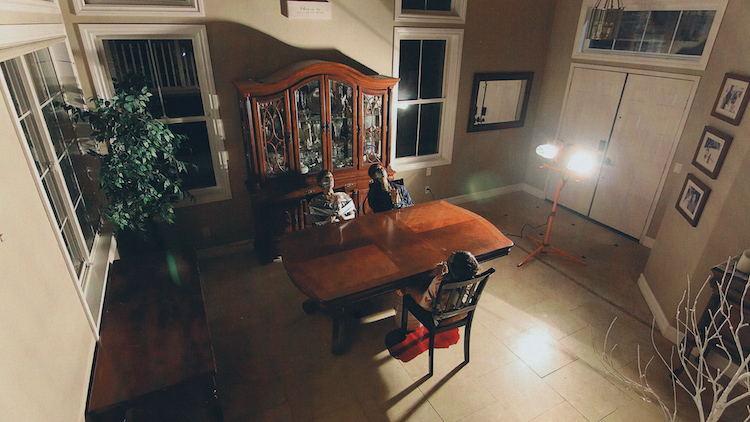
Barbara: I’m one of these people that I can watch the most gruesome stuff in movies, and it doesn’t bother me, heads getting drilled and stuff.
Peter: Bless You.
Barbara: But it really upsets me to see people getting hurt, even these skateboarding videos and such, and this movie messed with my brain because I knew it’s fictional, but my brain got tricked into thinking it was real at times because the way it was done. I’m very impressed with the effectiveness of that.
Stuart: Thank you.
Barbara: Why do this in a true crime format? What were you going for?
Stuart: I just think it’s a really interesting way to tell a story, and in particular to tell a horror story because it just allows you to have this vantage point that you don’t normally have with horror, to investigate certain details or aspects of a horror story that you wouldn’t focus on necessarily in a more conventional story. I think also documentary is great for horror because horror is all about, at least a lot of it is about, what you don’t see, about the implication of some greater terror that you can only imagine, and what you can imagine is always way scarier than what you can see. Sometimes you can get away with that in a conventional horror movie, but sometimes you can’t: you have to show the thing, and most of the time, it’s a guy in a suit or whatever, and it’s not very scary anymore. But with a documentary format, it’s okay to imply things, because we’re just a police procedural that’s about this thing. We have to kind of keep it in one place. So we can imply these other strange things that are going on, but we don’t have to commit to them, and that lets your imagination come in.
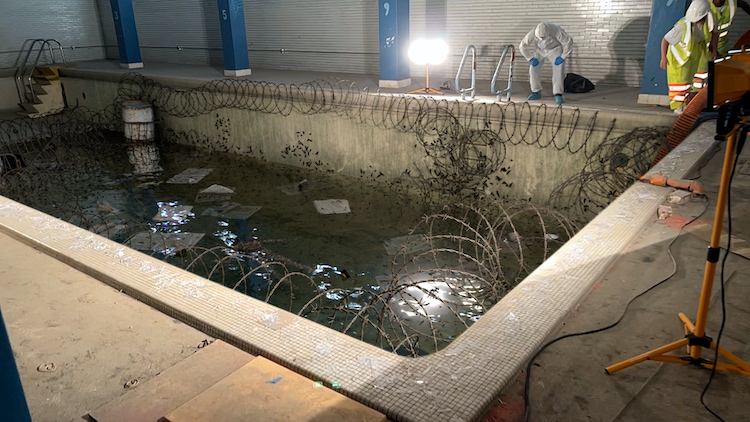 Barbara: Yeah. Yeah. Very cool. So what’s been your experience with true crime? How much exposure have you had to that? I mean, are you a big true crime junkie?
Barbara: Yeah. Yeah. Very cool. So what’s been your experience with true crime? How much exposure have you had to that? I mean, are you a big true crime junkie?
Stuart: Oh, it hugely influenced me. I’m one of those weirdos that would just listen to a new true crime story every night before I go to bed. I’d be listening to murder right before I fall asleep. I thought I was the only one for a long time. I never talked about it. You go on a first date, the first thing you don’t say is, “Yeah, I really like true crime murder.” But then during Covid in 2020, this documentary came out called “Tiger King” that was a big phenomenon. It was really popular, and it’s great. I loved it. A great filmmaker, as well. But it kind occurred to me that “Tiger King” is basically a true crime story. It’s really ridiculous and silly, but it is a true crime story, and it occurred to me that true crime had really come into the mainstream. Then I suddenly realized there was this whole audience for these horrifying stories. People you’d never imagined, a suburban soccer mom, would be just as obsessed as I am. So it sort of seemed like the time was right to do it.
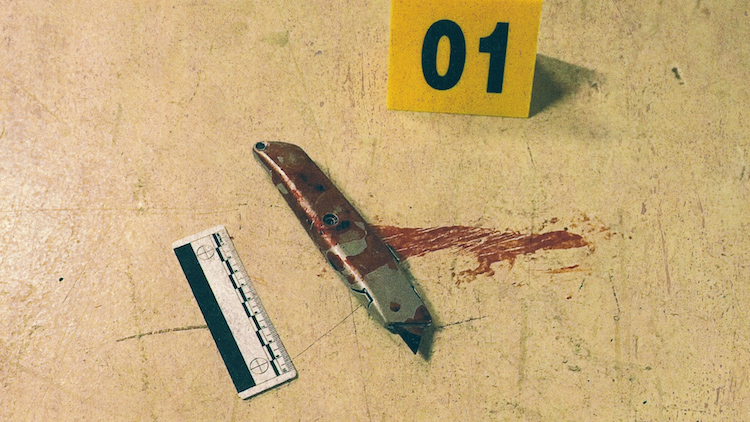 Peter: Yeah. I’m realizing it’s interesting. I realized little things during the course of these interviews that we’re doing, which is interesting. I was obsessed with serial killers before true crime was a thing. I was always reading books. I was a big Ann Rule fan. “The Stranger Beside Me” was the greatest of all time. I tell people that story, just the set up. They’re like, “Are you kidding? He was at a suicide convention hotline?” Ted Bundy was her best friend while she was writing the book about Ted Bundy. He was the guy. And then, yeah, massive true crime watcher and podcast listener. It is really exciting, even in retrospect now, that the first movie that I’ve had a starring role in, I get to play a guy that catches a serial killer. It’s really kind of sweet. And this is really wild: The first idea that I ever had for a screenplay was about a serial killer whose name was Kirby. (to Terri) Did you know this?
Peter: Yeah. I’m realizing it’s interesting. I realized little things during the course of these interviews that we’re doing, which is interesting. I was obsessed with serial killers before true crime was a thing. I was always reading books. I was a big Ann Rule fan. “The Stranger Beside Me” was the greatest of all time. I tell people that story, just the set up. They’re like, “Are you kidding? He was at a suicide convention hotline?” Ted Bundy was her best friend while she was writing the book about Ted Bundy. He was the guy. And then, yeah, massive true crime watcher and podcast listener. It is really exciting, even in retrospect now, that the first movie that I’ve had a starring role in, I get to play a guy that catches a serial killer. It’s really kind of sweet. And this is really wild: The first idea that I ever had for a screenplay was about a serial killer whose name was Kirby. (to Terri) Did you know this?
Terri: No
Peter: Yeah, the serial killer’s name was Kirby. The idea was a method actor who would research playing a serial killer by actually killing people, and that when he gets the Oscar for best actor, that’s when he says, “I want to apologize to all the families.” It was a cool kind of idea I had.
Barbara: That is cool. I like it.
Peter: But it was tough to not give it away, so I never really wrote it, but Kirby was a kind of perky sounding guy’s name that doesn’t sound like a scary name. And I’m playing Detective Joe Kirby. It’s cool. Very cool.
Terri: Well, I grew up in Kansas City. I’ve always been fascinated [with serial killers]. I’m fascinated with their childhoods, and what gets them into the mindset of doing it. When I was fifteen, there was a kidnapping nearby, and it hit home. She was kidnapped on her way home with her brother who ran five steps ahead of her. He turned around, she’s gone, and they found her dead. Years later, they found her bones in the incinerator at my high school. We were all freaking out like, “Oh, they’re going to come into my house.” It ended up being the maintenance worker at the high school I went to. They didn’t catch the guy until twenty-five years later. He actually still worked there [after he killed her]. Then the BTK was 30 minutes from where we lived. It’s scary. I was very paranoid growing up. Maybe it’s because of the Psycho movie too. My mother was pregnant with me during that.
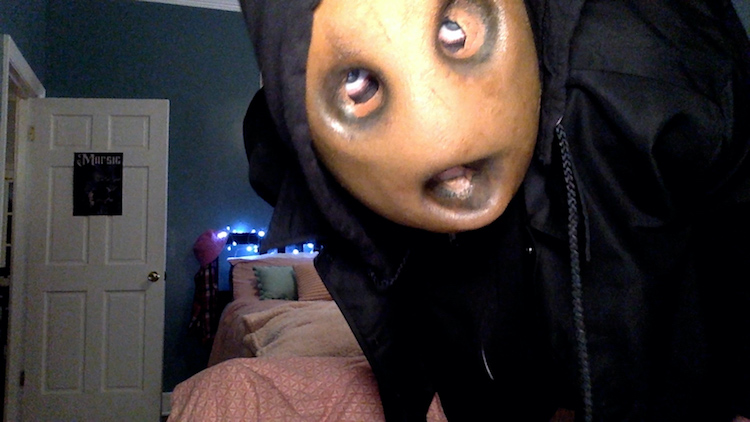 Barbara: What do you think about internet activity? Where the internet kind of investigates and then they try to solve the cases?
Barbara: What do you think about internet activity? Where the internet kind of investigates and then they try to solve the cases?
Terri: I love that. I love that. I actually think that human beings can kind of help solve these things. 100%.
Stuart: Everyone is like an amateur armchair detective these days. And sometimes I hear about these people, and I’m like, “Ah, I don’t know.” There’s just these people that are obsessively obsessed in true crime, in the way that kind of makes me uncomfortable, actually. But at the same time, who am I to say that? Because these people have actually solved crimes before, and information has come to light because these people are out there researching so….
Peter: Something that Stuart wove into this that I think makes it really cool and also gives you a hint on the way through it that maybe this isn’t a true story exactly, is the supernatural component. And so even when you watch my detective looking at these symbols and trying to make sense out of what he’s looking at, you also get the sense that I’m curious about what this is, and is it something that is something? And I think I’m going to ask you this question too. Did you see the scene after the end credits?
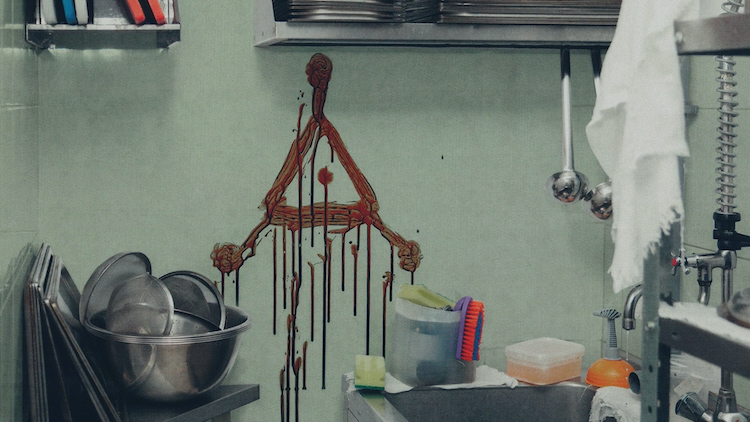 Barbara: Yes. And I was going to ask about that. If this is a setup for (redacted to avoid a spoiler)?
Barbara: Yes. And I was going to ask about that. If this is a setup for (redacted to avoid a spoiler)?
Stuart: This is a setup. Listen, I don’t want to get too in the weeds with it. But I will say that, depending on how this film goes, I have a lot of different ideas for a lot of stories that are all set in a shared world, a cinematic universe, basically, that would be told in sort of similar documentary stories. And characters from Strange Harvest will definitely return.
Barbara: Oh, awesome. Awesome. So what does it mean to have this film premiere here at Fantastic Fest?
Stuart: I mean, for me it’s a dream come true. Honestly, I’m so stoked when we first drew. I think it’s a great festival for us to do our premiere at. I think the audiences here are just, they’re one of us. All the horror and fantasy fans are out here, and I think they’re going to love this movie. You could watch this movie twenty times, and not see all the stuff. It’s tailor-made for a crowd that loves to re-watch the movie and connect the dots and all these details. Plus, we’ve got some satisfying genre moments. If you’re after the kills, we got some kills in this film. So yeah, I think there’s a great audience. But that said, I think the movie also can play to a much wider audience, as well. The horror audience is going to eat it up, but I think this has a little wider appeal with true crime fans.
Barbara: Oh yeah, the true crime junkies are going to love it.
Peter: Yeah, that’s the thing. We were talking about how Terri herself had trouble sitting through the film.
Terri: I did,
Peter: But she’s a massive true crime fan. If you’re like the soccer mom who loves true crime, you’re going to love this movie. Also, if you’re a fan of the Terrifier series, you’re also going to dig this movie, which is cool. It’s cool that you’ve seen it. I’ve been really pleasant surprised that virtually every person that’s interviewed has clearly seen it, knows about it. And it really puts in stark contrast the couple that didn’t see it. They’re just like, “So…Strange Harvest. Tell me about that. What made you think of this movie?”
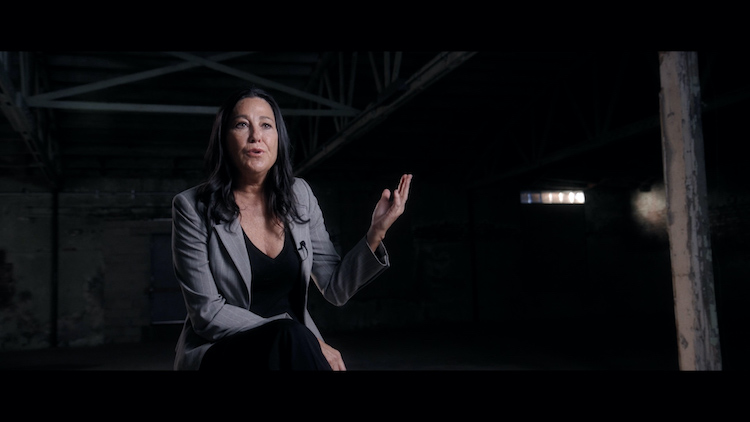 Terri: It’s a movie you have to see to do an interview, I think
Terri: It’s a movie you have to see to do an interview, I think
Barbara: I hate talking too much about the movie because I’m really anti-spoiler, so when I do interviews, I don’t tend to ask a lot about the film itself, which sometimes I feel like people think, “Did she even see it?”
Terri: But we can tell you saw it.
Barbara: I really loved it. I thought it was creepy and really cool. What did you guys do to prepare for the roles?
Peter: There was one particular true crime detective, Joe Kenda, that I went back, and I noticed he just had this almost permanent look of “Can you believe this shit?” I don’t make that face a lot as me, but I found this sort of way in facially, and then Stuart’s directive before I knew who Stuart was in my life was micro-expressions. Then my therapist knew a retired homicide detective in New York. There was a stoicism that he had describing really horrific things, just horrific things that I was able to adopt and imagine what this guy has internalized over the years, what he’s had to share with families and victims. He’s had to be the one to make the call or knock on the door. How can I show that he’s haunted but also not be too flat in my stoicism because that could be boring? It’s about finding the music. The writing is a huge step for any actor to put the right music to it.
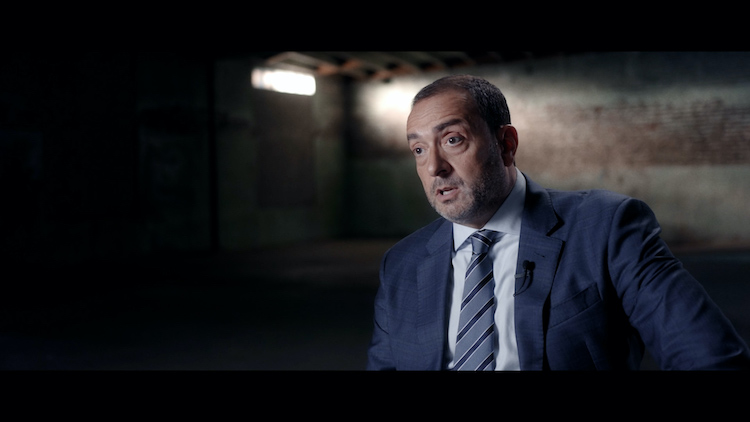 Terri: I just think for me, he had the backstory of the character there, so I just integrated that. She’s way different than I am personally as a human. But I got her, and I wanted to play her. I think she internalizes a lot of things, but she also grew up in kind of a toxic – I don’t want to give too much away – but I integrated some of that into her as a character from my personal life. I think there were some interesting dynamics. He had already put her on the page, and I don’t know if I brought her to life, but I just wanted to play her. And I mean, I just think you see the written work, then you play the scene, and you’re seeing the dynamic of the relationship between Peter and I. Then you start to live the character, and it just kind of breathes that, and you treat it as real.
Terri: I just think for me, he had the backstory of the character there, so I just integrated that. She’s way different than I am personally as a human. But I got her, and I wanted to play her. I think she internalizes a lot of things, but she also grew up in kind of a toxic – I don’t want to give too much away – but I integrated some of that into her as a character from my personal life. I think there were some interesting dynamics. He had already put her on the page, and I don’t know if I brought her to life, but I just wanted to play her. And I mean, I just think you see the written work, then you play the scene, and you’re seeing the dynamic of the relationship between Peter and I. Then you start to live the character, and it just kind of breathes that, and you treat it as real.
Strange Harvest: The Occult Murder in the Inland Empire was a favorite of mine at this year’s Fantastic Fest, and I hope it does really well because I want to see so much more of these characters and this type of content from Stuart Ortiz.
Barbarella out!

